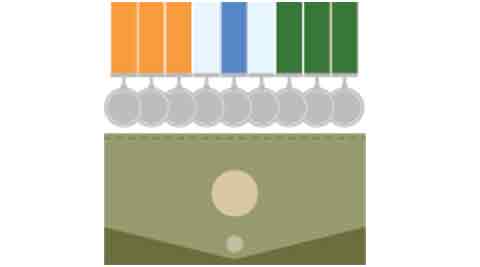Opinion Diary Item: Tales from the battlefront
Men such as Arjan Singh faced death in combat, and death retreated.

 India’s armies have been shaped by three eras of transition during the last thousand years.
India’s armies have been shaped by three eras of transition during the last thousand years.Many years ago, during a convivial conversation, the wonderfully affable and astute former vice president, the late Bhairon Singh Shekhawat, observed that listening to debates in the Rajya Sabha was perhaps the best education one could get in public life. I was as sceptical then as you possibly are now, but anyone who has been a member will tell you this is true. The MPs bring a range of esoteric knowledge to a lifetime’s variety of experience: This is the arithmetic of wisdom. What a pity that the Rajya Sabha’s reputation should be pockmarked with holler rather than the highs and lows, thrust and parry, of debate. I was reminded of Shekhawat when at least one of the 57 MPs making their farewell speeches on Friday the 13th, rued the fact that he had been forced to sabotage proceedings by rushing around the well of the House, and raising slogans due to what he described as political compulsions.
MPs should be sitting instead of standing, not least because when they are sitting they are outstanding.
Every eye in the hall was moist with pride when, on Tuesday evening, Marshal of the Air Force Arjan Singh, tall, erect and handsome at 97, stood up to release Air Vice Marshal Arjun Subramaniam’s excellent history, India’s Wars 1947-1971. The Marshal, who served on the front lines during the Second World War and was air chief in the 1965 war with Pakistan, reminisced about the campaign against the Japanese advance from Burma, and the spirit that has made our military the fighting force that it is. Men such as Arjan Singh faced death in combat, and death retreated.
India’s armies have been shaped by three eras of transition during the last thousand years. The first, to coin a phrase, might be called “feudal nationalism”. Armies wrote the history of India with a sword in service of dynasties. This roller-coaster continued till The East India Company, fusing mercantile wealth with territorial ambition, raised its own armies and adapted its recruits, particularly after the near-fatal experience of 1857, to “colonial nationalism”. I suspect that fierce regimental loyalty was encouraged by the British to camouflage the contradictions in this concept. The third transition, through the freedom movement, was towards democratic nationalism. The first, and most critical test, came within weeks of 1947, in Kashmir. Our armed forces fought to save Kashmir and India. Our armed forces have served, with valour and rectitude, both the state and the Constitution. They are not only guarantors of security but also a fundamental pillar of democracy, unaffected by temptations that have bedevilled some of our neighbours. We cannot honour them enough.
Query: Why are the British battles remembered in the name of the commanding officer, and the Indian ones in the name of the king? Waterloo is synonymous with Wellington; Trafalgar means Nelson. Who cares who ruled Britain when Robert Clive prevailed at Plassey and Hector Munro won Buxar. Answer: The British monarchs rarely stepped on the battlefield, and the Indian monarchs were rarely off it. Why? Because the last battle that England fought against invaders on its own soil was in 1066. The Normans won the battle, and then England won the war through a fabulous role reversal. The French conquerors became more English than the English.
Major General Ian Cardozo, sitting on the panel, recalled a splendid encounter from 1971 that sums up the Indian army’s espirit de corps. A force of just around 650 men was ordered to capture Sylhet in what was then East Pakistan. Such was the skill and panache of our assault that two Pakistani brigades holed up behind conventional defences surrendered, leaving the enemy looking something worse than defeated — stupid. After the victory, General Cardozo spotted a Pakistani soldier with a truckload of blankets. The Indian jawans did not have anything sufficiently warm for December nights during field operations, so General Cardozo diverted the blankets to his troops. If any were left over, he said, they could be allotted to officers. The Pakistani soldier was incredulous. Could it be true that officers did not have blankets? General Cardozo replied: “Jab jawan ke paas nahin hai to afsar ke paas kaise ho sakta hai? [When a jawan does not have it, how can an officer have a blanket?]” The Pakistani soldier replied: “Janab! Agar yeh hamare army key liye sach hota to yeh din kabhi nahin dekhney hotey! [Sir! If this had been true of our army, we would never have had to see this day of defeat.]”
The book is even more engrossing than the stories at the launch.





